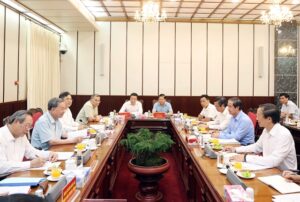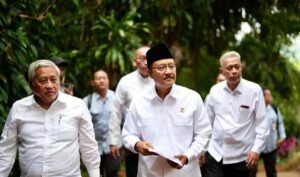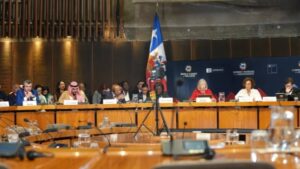Legal Options on Kashmir should be explored

Islamabad, The Gulf Observer: The Institute of Regional Studies organized a roundtable discussion in connection with the Kashmir Solidarity Day. The event was moderated by Ms. Humaira Iqbal, Research analyst from IRS. Participants included Ambassador Naghmana Hashmi, Ambassador Khalid Masood, Ambassador Shah Jamal, Ms. Fauzia Sana, DG Kashmir Cell at MoFA, Dr. Mujeeb Afzal, Asst. Professor at QAU, Dr. Shaheen Akhtar, Professor at NDU, Dr. Saeed Rid, Asst. Professor at QAU, Dr Hassaan Bokhari from South Asia Times.
Pakistan needs to amplify its efforts at various levels as India’s unilateral action of revocation of the special status of Kashmir has complicated the Kashmir issue
Arish U. Khan, Editor at IRS, spoke about the importance of the day and stressed that observing this day every year for the last 32 years not only expresses solidarity with the Kashmiri people but also makes the world aware of their plights. He emphasized that Pakistan needs to amplify its efforts at various levels as India’s unilateral action of revocation of the special status of Kashmir has complicated the Kashmir issue.
India sees itself as a regional hegemon and Pakistan needs a ‘strategic balancer’ to balance Indian hegemony in the region
Dr. Mujeeb Afzal, said that ‘India’s security mind-set has been a major problem for Pakistan as it does not believe in any territorial concessions’. He added that India sees itself as a regional hegemon and Pakistan needs a ‘strategic balancer’ to balance Indian hegemony in the region. Dr. Shaheen Akhtar was of the view that India has been working on the integration of J&K since its inception. The removal of the special status of Kashmir was nothing but a part of its greater integration plan, she added. Looking at the existing scenario, there was no scope for restoration of the special status of Kashmir as both Indian Parliament and Supreme Court seemed reluctant to undo the August 2019 illegal actions, she argued.
Dr. Saeed Ahmed Rid, expressed the view that since there was no acceptance of revocation of articles 370 and 35-A among all the political parties of the J&K and the secular parties of India, ‘Pakistan needs to effectively exploit that space to its advantage.
Pakistan should focus more on educating the Pakistani diaspora abroad about the Kashmir dispute for a greater impact at the international level
Former Ambassador to China, Naghmana Hashmi, emphasized that Pakistan should focus more on educating the Pakistani diaspora abroad about the Kashmir dispute for a greater impact at the international level. Dr. Hassaan Bokhari, stated that a popular narrative about Kashmir was essential to keep the issue alive and Pakistan needs to increase its outreach at domestic, regional, and intern vational levels for greater support of the international community.
Seasoned Diplomat and former Ambassador to China, Masood Khalid while commending Pakistan’s efforts in highlighting post-August 2019 actions by the BJP regime, was of the view that specific work by experts needs to be done to explore legal options vis-à-vis Kashmir dispute. Former Ambassador to Iraq, Shah M. Jamal insisted that Pakistan should continue to document Indian atrocities in Jammu and Kashmir. He dispelled the impression that India’s new domicile law had made significant headway and spoke about the challenges New Delhi is confronted with in IIOJK.
The participants while appreciating Pakistan’s efforts in keeping the issue alive and exposing India’s demographic manoeuvring and human rights violations in Jammu and Kashmir, urged that Pakistan needed to work more on exposing India’s subjugation designs, exploring legal options and reaching out to the diaspora abroad in highlighting the plight of the Kashmiri population and developing a broader domestic consensus over the Kashmir issue.


